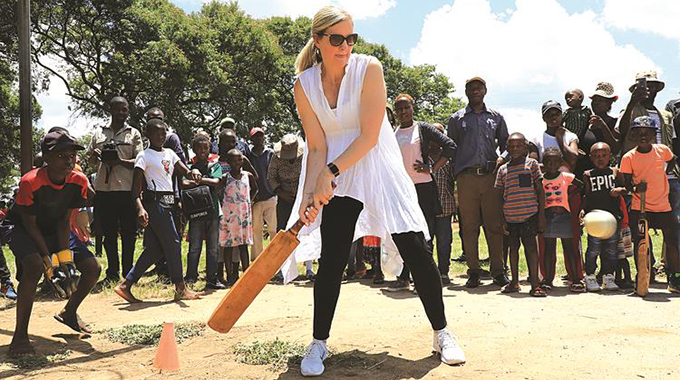Coping with family life during lockdown

Dr Mazvita Machinga Correspondent
As of Monday, the 30th of March, Zimbabwe, like many other countries worldwide, went into a 21-day lockdown.
We all agree that this is an “uncharted territory” that we find ourselves in. A territory that has raised a myriad of feelings and expressions. It’s normal to be in that space of bewilderment — not knowing what next? It is okay to feel that way.
This is a new reality to everyone in Zimbabwe, but it is necessary.
The lockdown has led to families across the country spending more time together than usual and this can create unhealthy conflicts if not handled well.
Historically, in crisis response, lockdowns have been initiated to save lives and are considered best practice. Worldwide, this has been done in schools, communities and nations in the face of life-threatening situations.
During this COVID- 19 crisis, our lockdown has been done to slow the transmission of the disease, to contain the outbreak thereby protecting individuals, families and communities.
However, depending on circumstances and in many instances, lockdowns may produce anxiety, stress, fear and loneliness for some.
A lockdown also impacts the economic and social status of people. The World Health Organisation (WHO) has warned that the coronavirus crisis and the restrictive measures that many countries including Zimbabwe are taking to contain the outbreak may have a negative impact on people’s mental health and well-being.
Thus, during lock down there are factors that are important for Zimbabweans to take heed of, so as to mitigate the negative impact on mental health and family life.
Studies carried out in other parts of the world show that mental health of people is likely to suffer as a result of the coronavirus lockdown.
The effects could also be long term. As people are obliged to stay at home, it is important to consider the effects of this pandemic on the mental health of our people.
Considering this, I discuss some hints on what families and individuals can do to minimise the long-term negative impact of this lockdown on mental health.
Remember, there is no one size fits all as to what to do. It all depends on your context and feasible alternatives; rural or urban, high density or low density, how are you spending your time as families? What is it that is working for you? The following are some of the activities that may be helpful.
- Manage your fears and anxiety — First and foremost by implementing infection control measures. Focus on reducing your chances of COVID-19 infection using ways that are being widely publicised through reliable official and media channels. Seek medical help for any symptoms. There is also psychological support offered to all who need it.
- Physical exercise is essential for good mental and physical health, so, please walk around your yard and shun sitting or sleeping the whole day. Exercises can come in many forms such as participating in house chores, yard raking leaves, house clean-up, and doing other physical work you may have shelved because of lack of time. Keep your body in good shape.
- Instead of being glued to your smartphones employ ways to have fun together. It is time to bond and have meals together, catch up on important family stories and even genealogies. Talk about your family trees, story time from grannies, etc
- Stay connected with others apart from your family — make calls to your friends and family outside the house and chat about your experiences. Protect your elderly from infection, give them information that is accurate
- Keep everyone entertained and gainfully occupied during this lockdown as it is easy to get bored and frustrated, so laugh and have fun together, read books, do some schoolwork, have a singalong for children and even Bible study. Music has the power to be uplifting and singing together may help raise spirits under lockdown.
- Be aware of unnecessary conflicts which come as a result of being together all the time, communicate to resolve issues in a healthy and positive way.
- Learn new things and skills, e.g. baking, music instruments, playing games such as cards, miming skills by getting family members to guess what you are acting out, etc
- Keep watch on your children — with the enormous disruption of day-to-day life, children are likely to be experiencing worry, anxiety and fear. They now have less opportunity to be with their friends. Parents and guardians be nice to children. Your temperament as parents matters in helping children manage. If children do exhibit stress or worry about the virus, ask them questions to gauge what they know and understand. Give them love and care and not place them to danger by shouting at them or even abusing them. Explain what is happening in a polite way that they can understand and answer their questions. Limit screen time for children and have variety of activities they can do at home.
- Maintain your mental and psychological well-being — this may be the greatest challenge for your family but remember it is time to engage in activities that give a sense of achievement. Establish daily routines to keep yourself and children engaged. Know what you need to do in the morning, afternoon and evenings.
- Connect to your spiritual leaders and resources for strength and do not neglect your spiritual life. Find strength and solace and power in texts, rituals, and practices. Pray as you are able
Remember, mental health is as important as your physical health and should be part of the public health response to Covid-19. It is therefore prudent to take care of yourself and protect others. Feel free to share and email what you are doing as families in coping with the lockdown.
Dr Mazvita Machinga (PhD, MSc Psychology, MA Theology) is a psychotherapist, mental health specialist and chair Zimbabwe Psychological Association Manicaland Chapter, based in Mutare. Contact 0771 754 519 or e-mail [email protected]










Comments